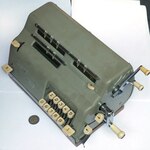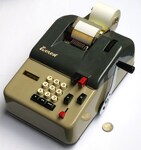

The Everest Z5R is a 10-key pinwheel calculator from the 1950s. It is somewhat similar in design to the Facit. It has a 13-digit main register on the top left, an 8-digit counter at the top right, and a moving 9-digit input register at the front.
Most of the controls are on the right hand side of the machine. There is a crank that will add the input to the main register when turned clockwise, and subtract when turned in the opposite direction. There are also clearing levers at the top right for the main register and counter, and a lever at the bottom right for clearing the input.
The counter automatically selects whether to count additions or subtractions depending on the first turn of the crank, but the counter direction can be overridden manually using the switch just below the counter. The division key shifts the input carriage all the way to the left, for entering the dividend as far to the left of the main register as possible. After entering the divisor, pressing the division key again shifts the carriage to the left but also clears the top digit of the counter if it still contains the 1 that was added from entering the dividend.
It has serial number 053909, which is visible through an opening in the case on the bottom of the machine. There is also a small lever that releases the latch that keeps the crank from reversing so that the crank can be freed if the mechanism somehow were to lock up.
Here is a video where I demonstrate the Everest Z5R.
The Everest Plurima is an adding listing machine produced between 1960 and 1965. This is the hand-driven version, the Plurima Manuale, but there also was an electrically driven version, the Plurima Elettrica, also called the Sprint.
This adding machine can do direct subtraction, and can handle negative totals. Input is done through the 10-key keyboard, and the numbers can be up to 8 digits long. There is a small input display window that shows how many digits have been entered. Pulling the crank then normally adds that number to the register. The machine has a two-coloured ink ribbon which allows it to print input numbers in black and the totals and subtotals in red.
The controls are as follows:
| 1-9 | Used for entering a number |
|---|---|
| ./../... | Enter 0, 00, or 000 |
| Crank | Print the current input and process it (usually by adding it to the register) and then clear the input. If there is no input, then pulling the crank twice prints the total, i.e. the current register value in red with a * symbol and clears the register |
| - | Subtract. A crank pull will print the current input with a - sign and subtract it from the register |
| ≠ | Non-add. A crank pull will just print the current input with a ≠ symbol without affecting the register |
| ⋄ | Subtotal. Pulling the crank twice when there is no input will now print a subtotal instead of a total. It prints the current register value in red with a diamond symbol without clearing the register |
| × | Multiply. Pulling the crank to add or subtract will perform the operation without clearing the input. You can then repeatedly add for a small multiplication, and for larger multiplications you can append zeroes to the input and add that |
| Red button | Clear the input |
When the register has a negative total, a red indicator is shown in the input display window. Negative totals and subtotals are printed correctly with a minus sign.
It has serial number 2,013,052, which is found below the front edge of the machine. It is very easy to remove the case. The blue upper section simply lifts up at the front, giving access to the printing mechanism for replacing the ink ribbon. To remove the rest of the case, first push in the subtract and non-add buttons and remove the tops of the three other control buttons. The case is simply held together by two metal spring clips on either side.
Here is a video where I demonstrate the Everest Plurima Manuale.
S.A. Serio, also known as Officine Serio (i.e. Serio Works) was founded in 1932 and produced typewriters under the brand name Everest. It was based in Crema in Italy, about 40km East of Milan, and named after the Serio river that flows through the town. In 1935 the company acquired Sozzi-Inzadi, a company based in Milan which made an adding-listing machine called Alfa. Serio continued to make the Alfa adding machine until about 1942. They then started to make a new calculator, the model Z. Apparently it had mostly antimony components due to materials shortages, and production was very limited. After the war production started in earnest with the model Z1. In the early 1950s they also began to make 10-key adding-listing machines.
Serio stopped producing calculators in the mid 1960s, but continued making typewriters. Around that time the company was bought by Olivetti, and was fully merged with them by 1969.
The Z series calculator went through several iterations, but it seems that the exact model name was only shown on the case from model Z4 onwards. It is unclear what the exact differences are between the models before then as they look virtually the same on the outside.
| Model | Year | Digits | Description |
|---|---|---|---|
| Z | 1942-1945? | 9×8×13 | Apparently used antimony parts, limited production |
| Z1 | 1947-1948 | 9×8×13 | |
| Z2 | ? | 9×8×13 | Decorative curved ridges on back of case |
| Z3 | 1948-1950 | 9×8×13 | |
| Z4 | 1951-1955 | 9×8×13 | Shift buttons and register clearing lever moved to right hand side |
| Z5 | 1953-1960 | 9×8×13 | Counter direction override switch; auto clear input for addition |
| Z5R | 1955-1962 | 9×8×13 | Back transfer; no auto clear input for addition |
| Maxim | 1952?-1965 | 10×9×17 | As Z5 but larger registers; split register; plastic casing |
| Maxim AR | 1954-1965 | 10×9×17 | As Z5R but larger registers; split register; plastic casing |
Serio also made many Everest adding-listing machine models. They inherited their first adding machine model when they bought Sozzi-Inzadi in 1938. The latter made the Alfa, and adding machine with a full keyboard with 10 columns. Serio continued its production until about 1942, after which Aldo Bona started making it instead. Presumably Serio sold the Alfa rights to them in order to concentrate on their typewriters and the Z series calculator. From 1952 Serio began producing adding machines of their own design.
Below is a table listing some of them, but note that the information is somewhat uncertain.
| Model | Year | Digits | Description |
|---|---|---|---|
| Alfa | 1938-1942? | 10×10 | Full keyboard. First made by Sozzi-Inzadi until Serio bought them; later made by Aldo Bona |
| M52 | 1952 | 12×13 | |
| M53 | 1953-1956 | 10×11 | |
| Multarapid | 1956-1958 | 10×11 or 12×13 | Dial for multiplication |
| Multarapid S | 1958-1962 | 10×11 | |
| M4 / Contarapid | 1959-1965 | 10×11 | Like Multarapid with automatic division |
| M58 | 1959 | 10×11 | Simplified M53 |
| M95 | 1959-1961 | 10×11 | |
| Plurima Manuale | 1960-1965 | 8×9, 10×11 | |
| Plurima Elettrica | 1961 | 8×9, 9×10 | Renamed Sprint from 1962 |
| Plurimatic | 1962-1965 | 10×11 | Same as Underwood Multimaster |
Apparently there were also Everest models M38 or Saldoconti, M46, and Multiplex, but there is almost no information about them online.
Here are a few ads and articles related to the Z-series calculators, or Everest in general.
There are are many more ads and articles for the various Everest adding machines.
© Copyright 2022-2025 Jaap Scherphuis, mechcalc a t jaapsch d o t net.